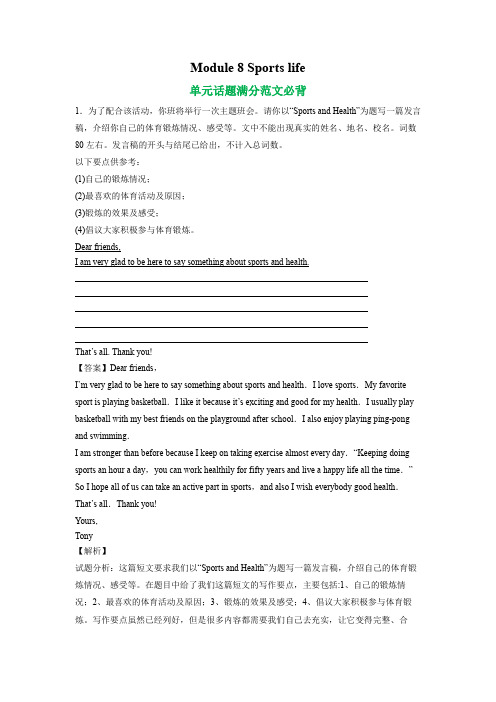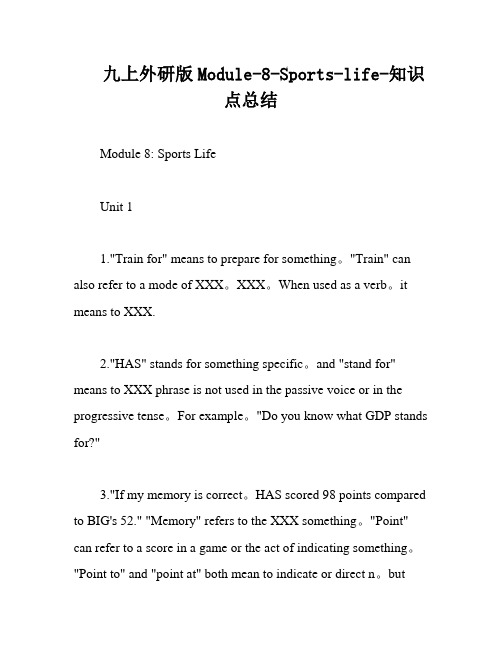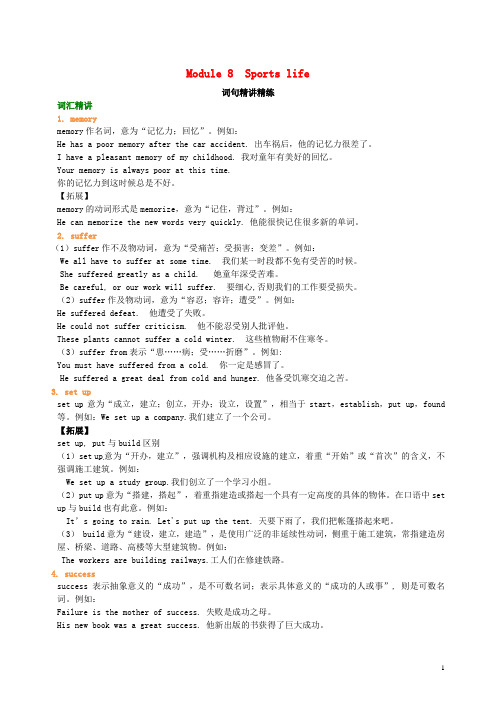【推荐重点】2019九年级英语上册 Module 8 Sports life词句精讲精练(含解析)(新版)外研版
- 格式:doc
- 大小:69.00 KB
- 文档页数:9

第8讲Sport life学习目标一、本模块重要的单词和短语、句型二、关于介绍体育明星作文的书写三、掌握一般过去时的结构四、掌握一般过去时的被动语态知识串烧单词1.stand for 是…的缩写,代表2.memory [ˈmeməri] n. 记忆,回忆3.point [pɔɪnt] n. 比分4.decision [dɪˈsɪʒn] n. 决定5.excuse [ɪkˈskju:s] n. (辩解的)理由,借口6.noon [nu:n] n.中午,正午7.seat [si:t] n. 座椅,座位8.no way 决不,不可能9.fair [feə] adj. 公平的,合理的10.k ick [kɪk] v. 踢11.m ad [mæd] adj. 生气的,恼火的12.s portsman [ˈspɔ:tsmən] n. (尤指职业的)运动员13.h igh jump 跳高14.a bility [ə'bɪlətɪ] n. 能力15.h urdling [ˈhə:dliŋ] n. 跨栏赛跑16.s portswoman [ˈspɔrtsˌwʊmən] n. (尤指职业的)女运动员17.r ace [reɪs] n. 赛跑,比赛18.r ecord [ˈrekɔ:d] v. &n. 记录;最佳记录19.m ethod [ˈmeθəd] n. 方法,办法20.h urdles [ˈhə:dlz] n. 跨栏赛跑21.J apan [dʒəˈpæn] n. 日本22.b reak [breɪk] v. 打破(纪录),打碎23.s portsperson [ˈspɔ:tspɜ:sn] n. 运动员24.A sian [ˈeɪʃn] adj. 亚洲的,亚洲人的25.s uffer [ˈsʌfə] v. 患有(疾病等),经受26.s uffer from … 受(某种病痛)折磨,因…而受苦27.f irst place 第一名,冠军28.s top sb. (from) doing sth. 阻止某人做某事29.c ourage [ˈkʌrɪdʒ] n. 勇气,胆量30.p ride [praɪd] n. 自豪感,骄傲31.t ake pride in 感到自豪课文Unit 1. If I start after dinner, I’ll finish it before I go to bed. Dad: Tony, you're playing the guitar again. Have you done your homework'?Unit 1 Daming wasn’t chosen for the team last year Lingling: Hi, Tony, you look tired.Tony: Yes, I’m training for the big match next week.Betty: Who are you playing against?Tony: HAS.Lingling: What does HAS stand for?Tony: Haidian All Stars.Betty: Oh, yes. It’ll be a difficult match. Didn’t they beat you last time?Tony: Yes, they did. But…Lingling: What was the score?Betty: If my memory is correct, HAS 98 points to BIG 52.Tony: But Daming wasn’t chosen for the team last time. That was a bad decision. We can’t play well without him.Lingling: That’s no excuse!Tony: But Daming is back now. There’s no difference between the two teams this season.Betty: When is the match?Tony: It’s next Saturday at noon, but if you want good seats, you should come by 11:30. Are you coming? Betty: I’m not sure. Do you think they’ll win, Lingling?Lingling: No way! How many matches have you played against HAS this year?Tony: Well, about three.Betty: And how many have HAS won?Tony: Er… most of them.Betty: Wrong! All of them! Face the truth, Tony. You’ve got no chance!Tony: I don’t agree. That’s not fair! (Tony leaves angrily.)Lingling: Remember to throw the ball, not knick it, Tony!Betty: He’s so mad at us that he’ll try harder to win, just to show we’re wrong!Lingling: Nice work, Betty! I do hope they win this time. We’ll be there to cheer for them.Unit 2 He was invited to competitions around the world.Liu Xiang---trained to win!For Liu Xiang, life as a sports hero began in 2004. First, he was invited to competitions around the world. Then, he was chosen for the Chinese team at the Athens Olympic Games and won a gold medal.Liu Xiang was not a successful sportsman at first. He was born in Shanghai on 13th July 1983, and started training when he was very young. In Grade 4, he went to the Sports School of Putuo District of Shanghai. Liu was encouraged at first to train for the high jump.In 1998, Liu Xiang’s ability in hurdling was noticed by Sun Haiping, who later became his coach. In 2001, a special programme was set up to help young sportsmen and sportswomen. Liu Xiang was among them. His races were recorded, and he was compared with the world’s best sports stars. Sun Haiping used the information to change his training methods for Liu Xiang.In May 2001, Liu Xiang won his first international 110m hurdles race in Japan. In 2004, he won the first Olympic gold medal for China in the 110m hurdles race, and at the same time broke the Olympic Games record. It was also the first time an Olympic gold medal for hurdling was hung round the neck of a sportsperson from an Asian country.Liu Xiang trained very hard. In fact, he trained so hard that he hurt his foot. From 2008 on, he suffered a lot from his foot problem, but he did not give up. Though he missed some competitions, he still returned to first place in the world 110m hurdles race in 2012.It is a pity that his foot problem stopped him from completing the 2012 London Olympic Games. But he is still a symbol of courage and success, and we continue to take great pride in him.语法一般过去时的被动语态被动语态由“助动词be+动词的过去分词”构成,人称、数和时态的变化是通过助动词be的变化表现出来的。

外研版九(上)Module 8 Sports life知识点详解Unit 1 Daming wasn’t chosen for the team last time.★(A3).【知识点再现】Hi, Tony, you look tired. 你好, 托尼! 你看起来很累。
【知识点1】look tired意为“看起来累”。
look用着系动词,意为“看起来”,其后常接形容词作表语。
类似系动词还有:taste/sound/smell/feel/seem/become/get / turn...+adj.(形容词)。
如:She looked a little tired. 她看起来有点疲倦。
You look beautiful in this green dress. 你穿这条绿裙子看起来很漂亮。
★(A3).【知识点再现】Who are you playing against? 你们和哪个队比赛?【知识点2】play against...意为“与……比赛/对抗”。
against是介词,意为“与……相反/相对;反对;违背”,通常与be连用,短语be against意为“反对”。
其反义词为be for意为“赞成”。
如:Our team played against Class Three. 我们队与三班进行了比赛。
The soldiers fought against the enemies fiercely. 战士们与敌人激烈战斗。
Are you against or for this plan? 你是反对还是赞成这个计划?★(A3).【知识点再现】What does HAS stand for? HAS代表什么?【知识点3】【辨析】stand for与represent的用法辨析:①stand for意为“代表,象征,是……的缩写,意味着”,多指抽象物体,是指用字母、数字或符号来表示一个单词,名字或是某个概念的缩写形式,其同义词为be short for或represent。


外研版英语九上Module 8《Sports life》模块教学设计一. 教材分析外研版英语九上Module 8《Sports life》模块主要讲述了与体育相关的各种话题,包括不同的运动项目、运动对身体的好处、如何合理安排运动时间等。
本模块共有5个学习单元,每单元包括课文阅读、语法讲解、听力练习、口语表达和写作训练等部分。
通过本模块的学习,学生能够掌握关于体育运动的词汇和表达方式,提高英语听说读写能力,并培养对体育运动的兴趣和热情。
二. 学情分析学生在学习本模块前已经掌握了英语基本语法和词汇,具备一定的听说读写能力。
但部分学生对体育运动的知识了解不多,可能对模块内容产生抵触情绪。
因此,教师在教学过程中应注重激发学生的学习兴趣,通过丰富多样的教学活动,帮助学生更好地理解和掌握模块内容。
三. 教学目标1.知识目标:学生能够掌握关于体育运动的基本词汇和表达方式,了解不同运动项目及运动对身体的好处。
2.能力目标:学生能够在不同情境下运用所学知识进行听说读写操作,提高英语实际运用能力。
3.情感目标:学生能够培养对体育运动的兴趣和热情,养成良好的运动习惯。
四. 教学重难点1.重点:体育运动相关词汇和表达方式的掌握,不同运动项目的了解。
2.难点:如何合理安排运动时间,运动对身体的好处的理解。
五. 教学方法1.情境教学法:通过设定各种体育运动场景,让学生在实际语境中学习体育运动相关词汇和表达方式。
2.任务型教学法:通过完成各种任务,激发学生的学习兴趣,提高学生的英语实际运用能力。
3.合作学习法:引导学生进行小组讨论和合作,培养学生的团队精神和沟通能力。
六. 教学准备1.教材:外研版英语九上Module 8《Sports life》模块教材。
2.课件:制作与模块内容相关的课件,包括图片、视频、音频等素材。
3.练习题:根据模块内容编写相应的练习题,用于巩固所学知识。
4.体育器材:准备与模块相关的体育器材,如篮球、足球、羽毛球等。

Module 8 Unit 11.stand for是.......的缩写;代表be short for 是......的缩写2. train for为……训练3. play against和......比赛4. beat sb.打败某人/团队win the match/prize赢得比赛/奖品lose to sb 输给某人5. Didn’t they beat you last time? 他们上一次没打败你们吗?(依据事实回答)Yes, they did. 不,他们打败了。
(上一次他们打败了你们,事实是肯定的)6. if my memory is correct如果我没记错的话have a good/bad memory记忆力好/差7. 98 to 52 98:528. Daming wasn’t chosen for the team last time.大明上一次没有被选进队里be chosen for 被选进...... (注意介词搭配)9. make a decision做决定= make up one’s minddecide v. ------ decision n.10. That’s no excuse.那不是借口。
the excuse for .....的借口There is no excuse to do sth 没有借口做某事an excuse 一个借口11. different adj. ----- difference n.make a difference to 对.....有影响,对......有作用12. at noon 在正午13. no way决不;不可能14. be seated 请坐sit down = take a seatHe seated himself at the table. 他在桌子旁坐下了。
15. by 11:30 在11:30 之前16. Most of them 他们中的大多数most of the people 大多数人= most peopleall of them 他们中的所有17. face the truth面对事实18. have no chance to do sth./have no chance of doing sth.没机会做某事19. remember to do sth. = don’t forget to do sth.记得做某事=不要忘记做某事20. agree to do sth 同意做某事agree with sb 同意某人(说的话或意见)agree on sth 就某事达成一致agree to + 计划等名词同意(某人的计划等)21. fair adj. 公平的----- unfair adj. 不公平的22. be mad at/with sb. = be angry with sb. 生某人的气She is mad at me for being late.be mad about sb./sth.特别喜欢某人或某物She is mad about kids.be angry at/about sth.对某事生气23. It’s wrong of sb to do 某人做某事是错误的24. nice work= good joy = well done做得好25. just to do只为做........26. cheer for sb.为某人加油cheer sb. up让某人开心/振作起来27. I do hope they win this time. 我真得希望他们这次赢。


Module 8 Sports life单元话题满分范文必背1.为了配合该活动,你班将举行一次主题班会。
请你以“Sports and Health”为题写一篇发言稿,介绍你自己的体育锻炼情况、感受等。
文中不能出现真实的姓名、地名、校名。
词数80左右。
发言稿的开头与结尾已给出,不计入总词数。
以下要点供参考:(1)自己的锻炼情况;(2)最喜欢的体育活动及原因;(3)锻炼的效果及感受;(4)倡议大家积极参与体育锻炼。
Dear friends,I am very glad to be here to say something about sports and health.That’s all. Thank you!【答案】Dear friends,I’m very glad to be here to say something about sports and health.I love sports.My favorite sport is playing basketball.I like it because it’s exciting and good for my health.I usually play basketball with my best friends on the playground after school.I also enjoy playing ping-pong and swimming.I am stronger than before because I keep on taking exercise almost every day.“Keeping doing sports an hour a day,you can work healthily for fifty years and live a happy life all the time.” So I hope all of us can take an active part in sports,and also I wish everybody good health.That’s all.Thank you!Yours,Tony【解析】试题分析:这篇短文要求我们以“Sports and Health”为题写一篇发言稿,介绍自己的体育锻炼情况、感受等。

Module 8 Sports life学习目标1、学会本单元重点单词和重点词组的运用2、语法知识点:被动语态(2)重点知识点1、decide (v.)决定常见搭配:decide to do sth=make a decision to do sth 决定做某事decision (v.)决定(可数名词)常见搭配:make a decision下决心()1.--Did you_____the first place of the basketball match?--Of course we did. We_____all the other teams.A.beat; beatB.win; beatC. win; wonD.beat;win()2.--He hasn’t watched the movie”So Yong”,has he?--______.He told me it’s very moving and interesting, he’d like to watch it again.A.Yes, he has.B. Yes, he hasn’tC.No, he hasn’tD.No, he has4、take pride in...=be proud of...感到骄傲、自豪5、encourage to do sth鼓励某人做某事be encouraged to do sth被鼓励做某事6、from+时间+on 从...开始1、去年他开了一家公司。
Last year he ______________a new company.2. 两年前,我们学校建立了一间图书馆。
A library______________in our school two years ago.3. 中华人民共和国是在1949年10月1日成立。
The People Republic of China___________October 1st ,1949.4. 我们搭起帐篷并且生火来取暖和做饭。

九上外研版Module-8-Sports-life-知识点总结Module 8: Sports LifeUnit 11."Train for" means to prepare for something。
"Train" can also refer to a mode of XXX。
XXX。
When used as a verb。
it means to XXX.2."HAS" stands for something specific。
and "stand for" means to XXX phrase is not used in the passive voice or in the progressive tense。
For example。
"Do you know what GDP stands for?"3."If my memory is correct。
HAS scored 98 points compared to BIG's 52." "Memory" refers to the XXX something。
"Point" can refer to a score in a game or the act of indicating something。
"Point to" and "point at" both mean to indicate or direct n。
but"point to" XXX or n。
while "point at" refers to a closer object or target.You cannot surrender。

九上外研版Module-8-Sports-life-知识点总结Module 8 Sports lifeUnit 11.train for为了…而培训train n.火车train v.训练train sb. to do.训练某人做某事2.What does HAS stand for? HAS代表什么?stand for意为“象征;代表”,该短语不用于被动语态,也不使用进行时态。
如:Do you know what GDP stands for?你知道GDP代表什么吗?3.If my memory is correct, HAS 98 points to BIG 52.如果我没记错的话,XXX98分比XXX52分。
XXX.记忆;回忆,指记住的人或事物时为作可数名词;指记忆的能力时为不可数名词。
如:I have XXX.我对祖父只有模糊的印象。
pointn.得分,其复数形式为points。
如:They lost the 1977 World Cup final to Australia by a single point.他们在1977年的天下杯决赛中仅以一分之差输给了XXX。
pointv.指;指向;朝向XXX XXX古代中国人就知道磁石会指南。
point of view意为“观点”,如:Try to look at this from my point of view.词义辨析:point to/point at/point out三个词组,其区别首假如:point to和point at都有“指向”之意,偶然能够交换。
但point to多指较远间隔的事物,to着重于指偏向,主语既能够是人,也能够是物。
point at多指向较近间隔的事物,at着重于指的工具,其主语平日是人。
XXX to the house on the corner and said, “That’s where I live. ”他指着拐角处的房子说:“我就住在那里。

Module 8 Sports life词句精讲精练词汇精讲1. memorymemory作名词,意为“记忆力;回忆”。
例如:He has a poor memory after the car accident. 出车祸后,他的记忆力很差了。
I have a pleasant memory of my childhood. 我对童年有美好的回忆。
Your memory is always poor at this time.你的记忆力到这时候总是不好。
【拓展】memory的动词形式是memorize,意为“记住,背过”。
例如:He can memorize the new words very quickly. 他能很快记住很多新的单词。
2. suffer(1)suffer作不及物动词,意为“受痛苦;受损害;变差”。
例如:We all have to suffer at some time. 我们某一时段都不免有受苦的时候。
She suffered greatly as a child. 她童年深受苦难。
Be careful, or our work will suffer. 要细心,否则我们的工作要受损失。
(2)suffer作及物动词,意为“容忍;容许;遭受”。
例如:He suffered defeat. 他遭受了失败。
He could not suffer criticism. 他不能忍受别人批评他。
These plants cannot suffer a cold winter. 这些植物耐不住寒冬。
(3)suffer from表示“患……病;受……折磨”。
例如:You must have suffered from a cold. 你一定是感冒了。
He suffered a great deal from cold and hunger. 他备受饥寒交迫之苦。
3. set upset up意为“成立,建立;创立,开办;设立,设置”,相当于start,establish,put up,found 等。

Module 8 Sports life词句精讲精练词汇精讲1. memorymemory作名词,意为“记忆力;回忆”。
例如:He has a poor memory after the car accident. 出车祸后,他的记忆力很差了。
I have a pleasant memory of my childhood. 我对童年有美好的回忆。
Your memory is always poor at this time.你的记忆力到这时候总是不好。
【拓展】memory的动词形式是memorize,意为“记住,背过”。
例如:He can memorize the new words very quickly. 他能很快记住很多新的单词。
2. suffer(1)suffer作不及物动词,意为“受痛苦;受损害;变差”。
例如:We all have to suffer at some time. 我们某一时段都不免有受苦的时候。
She suffered greatly as a child. 她童年深受苦难。
Be careful, or our work will suffer. 要细心,否则我们的工作要受损失。
(2)suffer作及物动词,意为“容忍;容许;遭受”。
例如:He suffered defeat. 他遭受了失败。
He could not suffer criticism. 他不能忍受别人批评他。
These plants cannot suffer a cold winter. 这些植物耐不住寒冬。
(3)suffer from表示“患……病;受……折磨”。
例如:You must have suffered from a cold. 你一定是感冒了。
He suffered a great deal from cold and hunger. 他备受饥寒交迫之苦。
3. set upset up意为“成立,建立;创立,开办;设立,设置”,相当于start,establish,put up,found等。
例如:We set up a company.我们建立了一个公司。
【拓展】set up, put与build区别(1)set up意为“开办,建立”,强调机构及相应设施的建立,着重“开始”或“首次”的含义,不强调施工建筑。
例如:We set up a study group.我们创立了一个学习小组。
(2)put up意为“搭建,搭起”,着重指建造或搭起一个具有一定高度的具体的物体。
在口语中set up与build也有此意。
例如:It’s going to rain. Let's put up the tent. 天要下雨了,我们把帐篷搭起来吧。
(3) build意为“建设,建立,建造”,是使用广泛的非延续性动词,侧重于施工建筑,常指建造房屋、桥梁、道路、高楼等大型建筑物。
例如:The workers are building railways.工人们在修建铁路。
4. successsuccess 表示抽象意义的“成功”,是不可数名词;表示具体意义的“成功的人或事”, 则是可数名词。
例如:Failure is the mother of success. 失败是成功之母。
His new book was a great success. 他新出版的书获得了巨大成功。
【拓展】(1)succeed 表示“成功”,是不及物动词;表示做某事做成功了,succeed 后通常接in doing sth。
例如:His plan succeeded.他的计划成功了。
At last he succeeded in solving the problem. 他终于把那个问题解决了。
She succeeded in (passing) the exam. 她考试及格了。
(2)successful作形容词,意为“成功的”。
例如:The performance was successful. 演出很成功。
It was a successful experiment. 那是一次成功的试验。
5. beatbeat是及物动词,有以下用法:(1) 意为“赢;打败;战胜”,后接人或某一团队、组织等,其过去式为beat。
例如:I beat him at long jump yesterday. 昨天跳远我赢了他。
(2) 意为“打;击”,表示连续不断的打击。
例如:Who is beating the drum? 谁在打鼓?(3) 表示“(心脏)等跳动”。
例如:I feel my heart is beating fast. 我觉得我的心脏在剧烈跳动。
【拓展】beat和win都有“赢”的意思,但用法不同:beat的宾语为人或相当于人的团体、组织;而win的宾语为比赛或某个项目,过去式为won。
例如:Though we were weak, we beat them. 虽然我们弱,但我们赢了他们。
Who wins the first prize in the competition? 谁在比赛中赢得了一等奖?6. break(1)作及物动词,意为“ 打破;打碎;使折断”。
例如:Take care not to break the cup. 小心别把茶杯打碎了。
If you pull too hard you will break the rope.如果你太用力拉,就会把绳子拉断。
She is eager to break the Olympic 100 meters record.她渴望打破奥运会100米记录。
(2)作不及物动词,意为“折断;破碎”。
例如:The thread breaks where it is weakest.线在最脆弱的地方容易断。
The rope broke and he fell to the ground.绳子断了,他摔到了地上。
(3)break作名词(通常为可数名词),意为“间歇;休息时间”(尤指工作期间)。
例如:She’s worked for 27 hours without a break.她已经不间断地工作了二十七个小时。
(4) break作名词,意为“机会;运气”(多用于口语中)。
例如:Give him a break and he’ll succeed. 给他一个机会,他会成功的。
7. return(1)return意为“返回,回来(回到出发地)”,可以作动词或名词。
例如:Blair will return to London tonight.今晚布莱尔将返回伦敦。
Ryle explained the reason for his sudden return to London.赖尔解释了他突然返回伦敦的原因。
What time does your husband return from work?你丈夫什么时候下班回家?(2) return 还意为“归还,退还”。
return sth to sb = return sb sth 把某物还给某人例如:Don’t forget to return my keys. 别忘了还我钥匙。
Please remind me to return the books to the library.请提醒我把这些书还给图书馆。
8. againstagainst是介词,其用法如下:(1) 反对,违反。
对应的反义词为for,常用于be against sb. / sth.反对某人/某事例如:Are most people against having a part-time job? 大多数人反对做兼职工作吗?(2) 和……交战(指竞争、比赛等)。
例如:We’ll have a basketball match against the team from No. 2 Middle School next week.下星期我们将与二中的球队举行一场篮球赛。
(3) 碰、装、擦。
例如:Rain beats against the window. 雨打在窗户上。
(4) 倚着、靠着。
例如:There was a ladder propped up(支撑) against the wall.一把梯子靠着墙。
(5) 防备,抗……。
例如:She saved money against old age. 她攒钱防老。
(6) 逆着……。
例如:We are sailing against the wind. 我们(的船)正逆风航行。
(7) 衬托,相映,对照。
例如:Red flags stand out brightly against the blue sky. 红旗在蓝天的衬托下显得分外鲜艳。
9. chancechance是名词,意为“机会”。
例如:Is there any chance of the team winning this week? 这个队本星期有无获胜的机会?It’s the chance of a lifetime. You shouldn’t miss it. 这是一生中难得的机会,你不应该错过。
【拓展】(1) chance作名词,还有“偶然性,可能性”的意思。
例如:I met him by chance. 我偶然遇到了他。
(2) chance与opportunity的辨析:1) 当表示有机会做某事时,这两个词的用法相同,后面可接to do或of doing。
例如:I had the chance/opportunity of visiting Beijing. 我曾有机会参观北京。
I had no chance/opportunity to see him. 我没有机会见到他。
2) chance后可接从句,而opportunity则不能。
例如:There is a chance that he will succeed. 他有可能获得成功。
词汇精练I. 写出下列动词的过去式和过去分词。
1. advise __________ __________2. break __________ __________3. choose __________ __________4. set __________ __________5. know __________ __________6. write __________ __________7. teach __________ __________ 8. take __________ __________II. 英汉互译。
1. 代表,象征_______________2. 建立,创立_______________3. be different from _______________4. at first_______________5. 实际上_______________6. encourage sb. to do sth. _______________7. 遭受……_______________8. take pride in_______________9. 放弃____________ pare with ______________III. 根据首字母提示或汉语提示,完成下列单词的拼写。